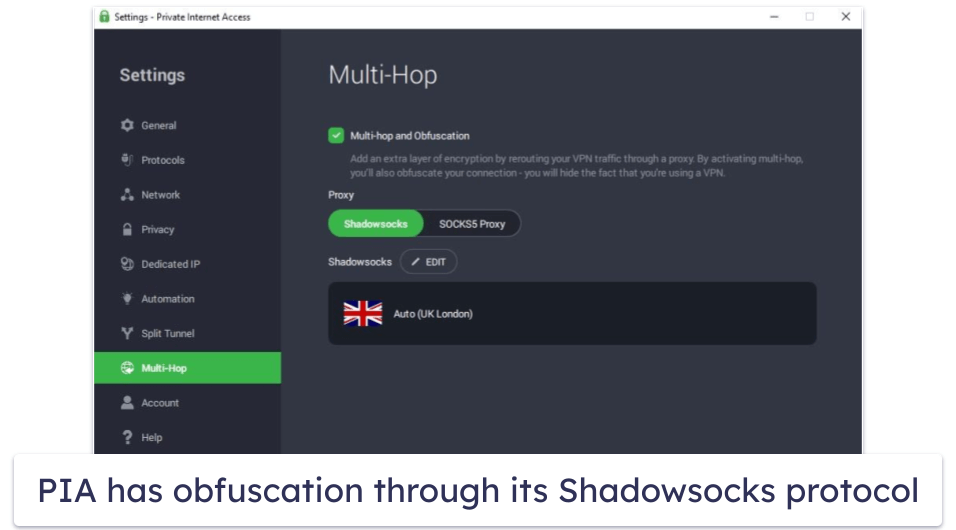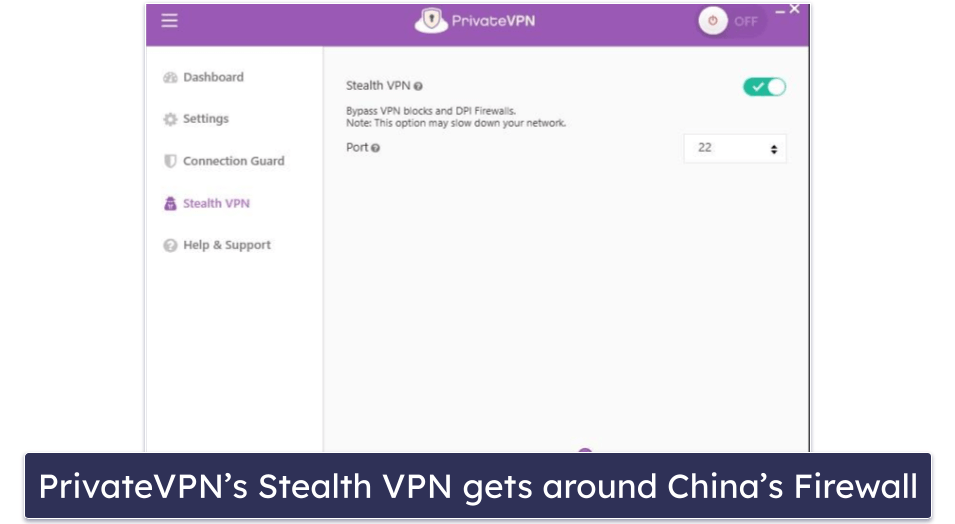
Short on time? Here’s the best VPN for Shanghai in 2025:
- 🥇 ExpressVPN : Comes with obfuscated servers that work in Shanghai 100% of the time, provides advanced security features, and maintains the fastest speeds on the market. Plus, it has a large server network in 105 countries, including ones near Shanghai, and works with 100+ streaming apps. All plans have a 30-day money-back guarantee.
In Shanghai, and most regions of China, the Great Firewall restricts the internet. The government controls what online content people can see, usually favoring sites that agree to share data with them.
To access the free internet, you can use a VPN. A VPN hides your real IP address and gives you a new IP address from the server location you connect to. Plus, it encrypts your traffic, so malicious third parties, like Chinese internet service providers won’t be able to spy on your online activities, such as the sites you visit, the apps you open, or the files you download.
After weeks of testing, I found some reliable VPNs that work well in China. Though every option on my list will work, ExpressVPN is my favorite for its really strong security and fast connection speeds. Editors' Note: ExpressVPN and this site are in the same ownership group.
Quick Summary of the Best VPNs for Shanghai in 2025
Disclaimer: The Chinese government only approves using certain VPNs that comply with its bans and requirements. There are no instances of individuals being punished for using VPNs, but it’s best to be cautious. I don’t recommend using a VPN for illegal activities, including copyright infringement, and I encourage following the local laws and regulations.
Editors' Note: Intego, Private Internet Access, CyberGhost and ExpressVPN are owned by Kape Technologies, our parent company
🥇1. ExpressVPN — Best Overall VPN for Shanghai
ExpressVPN is my top choice for Shanghai. It can reliably access the web in Shanghai thanks to its effective obfuscated servers — the VPN has servers in 105 countries, including ones near Shanghai, like Hong Kong, Taiwan, and Japan. These servers hide your VPN traffic to make it look like regular internet traffic (ExpressVPN recommends using the Automatic protocol in Shanghai).
The VPN is also extremely secure as it comes with tons of advanced security features, including:
- RAM-only servers. These servers write data to the RAM instead of the hard drive. So, every server reboot erases all data.
- Full leak protection. ExpressVPN comes with full leak protection against DNS, WebRTC, and IPv6 leak protection. I ran a bunch of leak tests while connected to the provider’s servers, and it never leaked my IP address.
- An audited no-logs policy. ExpressVPN’s no-logs policy has been independently audited and verified, confirming that the VPN doesn’t store your IP address, browsing history, or what files you download.
- Perfect forward secrecy. This security feature changes the encryption key for each session, minimizing the amount of data potential hackers could access.
This provider had the fastest speeds in my speed tests. Websites loaded instantly, and I had no issues watching videos in HD and 4K. I really like ExpressVPN’s split-tunneling feature. It allows you to choose which apps use the VPN tunnel and which don’t, so you can access both local and blocked content without having to turn off your VPN.

ExpressVPN also has something called mirror links, which are duplicates of their website under different URLs. By using these links, the Chinese government can’t completely block access to the VPN’s site, so people in Shanghai can still reach it and download the app. To get a mirrored link, you need to contact ExpressVPN’s customer support team via email.
The VPN is great for streaming in Shanghai. It can access 100+ streaming sites including 10+ Netflix libraries, Amazon Prime, Hulu, Max, as well as iQiyi and Tencent video.
ExpressVPN has plans starting at $4.99 / month. Each plan has a 30-day money-back guarantee.
Bottom Line:
ExpressVPN is my favorite VPN for Shanghai. It reliably works in Shanghai due to its obfuscated servers, which are located in over 100 countries and work with 100+ streaming services. It has advanced security features, maintains the fastest speeds on the market, and comes with useful extra features, like split-tunneling. Its apps are intuitive, and all plans have a 30-day money-back guarantee.
Read the full ExpressVPN review
🥈2. Private Internet Access — Strong Security Features + Customizable Apps
Private Internet Access (PIA) is secure and works in Shanghai. Its Shadowsocks protocol makes your VPN traffic look like regular traffic, allowing you to connect to a server in another country and visit any website you want. The VPN has servers in 91 countries, including Hong Kong and Taiwan, and can access 30+ streaming sites like Netflix and Disney+.
I found PIA’s apps quite customizable — you can personalize 20+ settings. For example, I changed encryption levels from 256-bit AES to 128-bit AES for faster connections (and the latter is still very secure). Plus, you have connection options, like whether to automatically connect to the VPN on unsecured Wi-Fi networks.
PIA comes with advanced security features, like RAM-only servers, full leak protection, an audited no-logs policy, and perfect forward secrecy. PIA also has the best ad blocker on the market, called PIA MACE, which blocks malicious sites and ad trackers (and they won’t see your browsing data).

The VPN has great privacy features. PIA releases regular transparency reports that prove that it doesn’t store or share user data with the authorities. In addition, PIA’s apps are open-source, meaning anyone can examine the source code for security issues.
This platform had fast speeds during my speed tests. Websites loaded in 1–2 seconds and HD videos loaded in 2 seconds without any buffering. However, PIA is slower than ExpressVPN.
Private Internet Access has affordable plans starting at $2.03 / month. All plans have a 30-day money-back guarantee.
Bottom Line:
Private Internet Access has strong security features and is highly customizable. Its Shadowsocks obfuscation protocol masks your VPN traffic as regular traffic, so it can work in Shanghai. Plus, it has good streaming support, great privacy features and fast speeds. All of PIA’s plans are backed with a 30-day money-back guarantee.
Read the full Private Internet Access review
Editors' Note: Private Internet Access and this site are in the same ownership group.
🥉3. PrivateVPN — Intuitive Interface With Decent Speeds
PrivateVPN is good for browsing the internet in Shanghai and protecting your privacy online. Its obfuscation setting is known as Stealth VPN, and it works reliably at various times of day. Plus, the VPN has servers in 63 countries that work with popular streaming sites such as Hulu, Netflix, and Max. It also offers servers near Shanghai for the best possible speeds.
The VPN has a user-friendly interface, so it’s a great option if you’re new to VPNs. It’s easy to use the Stealth VPN and manually connect to a server. Plus, you can use the Simple View, which doesn’t allow much customization, or switch to Advanced View, which allows you to change many settings.

This provider maintained fast speeds in my tests. Websites loaded in 2–3 seconds, and HD videos loaded with minor buffering in the beginning. That said, PrivateVPN is slower than ExpressVPN.
The provider comes with perfect forward secrecy, DNS and IPv6 leak protection, and RAM-only servers. However, it’s missing RAM-only servers, and its no-logs policy hasn’t been independently audited — unlike ExpressVPN and Private Internet Access.
PrivateVPN’s plans start as low as $2.00 / month. All plans have a 30-day money-back guarantee.
Bottom Line:
PrivateVPN is easy to use, very secure, and has fast speeds. It reliably works in Shanghai due to its Stealth VPN feature and can access top streaming sites. PrivateVPN has affordable plans that come with a 30-day money-back guarantee.
Read the full PrivateVPN review
4. TunnelBear — Beginner-Friendly VPN
TunnelBear is a user-friendly VPN that works well in Shanghai. Its obfuscation tool, called GhostBear, can be enabled with a single click. What’s more, TunnelBear is intuitive to use and allows unlimited simultaneous connections.
The VPN has servers in 47 countries, which is a smaller server network than ExpressVPN’s 105 countries. However, TunnelBear’s servers are evenly spread out across the globe with servers in Taiwan and Hong Kong and its servers can access top streaming services like Netflix and Amazon Prime. I had fast speeds in my tests — websites loaded in 4 seconds, and HD videos loaded in 4–5 seconds with some interruptions.

This provider has decent security features, like an audited no-logs policy and full leak protection. However, I don’t like that the VPN lacks RAM-only servers and perfect forward secrecy like most other VPNs on this list.
TunnelBear has plans starting at $3.33 / month. While there’s a free plan, it only allow 2 GB per month, which is only enough for a couple of hours. Unfortunately, it doesn’t come with a money-back guarantee.
Bottom Line:
TunnelBear works reliably in Shanghai and is beginner-friendly. It has servers in countries near Shanghai, maintains fast speeds, has good streaming support, and comes with high-end security features. The VPN doesn’t offer a money-back guarantee, but there’s a limited free plan if you want to test it out.
Read the full TunnelBear review
5. VyprVPN — Strong Security Features
VyprVPN has its own proprietary Chameleon protocol that hides your VPN connection. It has servers in 70+ countries that can access 45+ streaming sites like Netflix and Hulu, and it’s got servers in nearby locations, including Hong Kong, Macau, and Taiwan.
The VPN has advanced security features. It provides DNS leak protection, comes with perfect forward secrecy, and its no-logs policy has been independently audited.
During my speed tests, VyprVPN had decent speeds. Websites loaded in 5 seconds, and HD videos played in 5–6 seconds with a little buffering in the beginning. However, VyprVPN doesn’t match ExpressVPN’s speeds.

I like how user-friendly VyprVPN’s apps are. There are helpful explanations for all settings and features, so you won’t feel overwhelmed about using them.
VyprVPN’s plans start at $3.00 / month. Every purchase is backed with a 30-day money-back guarantee.
Bottom Line:
VyprVPN comes with a Chameleon proprietary protocol that helps you connect to a nearby country outside of Shangai with less internet restrictions. It’s secure, can access lots of streaming sites, fast, user-friendly apps, and backs its plans with a 30-day money-back guarantee.
Quick Comparison Table
Editors' Note: Intego, Private Internet Access, CyberGhost and ExpressVPN are owned by Kape Technologies, our parent company
How to Choose the Best VPN for Shanghai in 2025
- Find a VPN that works in Shanghai. All the VPNs on this list can reliably bypass China’s Firewall without detection.
- Choose a VPN with strong security features. All of my top picks have industry-standard security features, like 256-bit AES encryption, a kill switch to disconnect you from the internet if your VPN connection fails, and a no-logs policy.
- Consider speeds. All VPNs slow down your speeds due to the encryption process, but top VPNs are able to maintain fast speeds across all servers. ExpressVPN had the fastest speeds in my tests.
- Go for a VPN that’s user-friendly. I only recommend VPNs that have an intuitive interface, which makes it easy to find a server, plus user-friendly obfuscation tools.
- Get a VPN that offers good value. All the VPNs on this list have generous money-back guarantees, affordable plans, and extra features, like split-tunneling.
Top Brands That Didn’t Make the Cut
- CyberGhost VPN. CyberGhost VPN is a secure and fast VPN with a large server network. However, it doesn’t reliably work in restrictive countries like China.
- NordVPN. NordVPN has top-notch security features and fast speeds across all servers. However, its customer support representatives confirmed it won’t work in Shanghai.
- Surfshark. Surfshark is a user-friendly and affordable VPN, but it doesn’t reliably work in restrictive countries like China.
Frequently Asked Questions
What’s the best VPN for Shanghai?
ExpressVPN is my top choice for Shanghai. Thanks to its obfuscated servers, the VPN reliably works in Shanghai. It has the fastest speeds on the market, advanced security features, can access 100+ streaming sites (including lots of different international libraries), and really user-friendly apps.
Can you use a free VPN for Shanghai?
Yes, but I don’t recommend it. Most free VPNs don’t reliably work in restrictive countries, have slow speeds and small server networks, and put data caps on a daily and monthly basis. Instead, I recommend purchasing a top VPN, like ExpressVPN — it can bypass China’s firewall, has fast speeds, and provides strong security features.
Can you use a VPN in Shanghai?
The use of non-government-approved VPNs is banned in Shanghai. Although there aren’t any instances of individuals being fined for using a VPN, it’s important to follow the local laws and regulations.
Will a VPN slow down my internet speed in Shanghai?
Most VPNs will slow down your speeds, but top VPNs can minimize this speed loss. Some speed reduction is expected due to the encryption process and rerouting of traffic. Luckily, the VPNs on this list maintain fast speeds across all servers. ExpressVPN had the fastest speeds in my tests.




